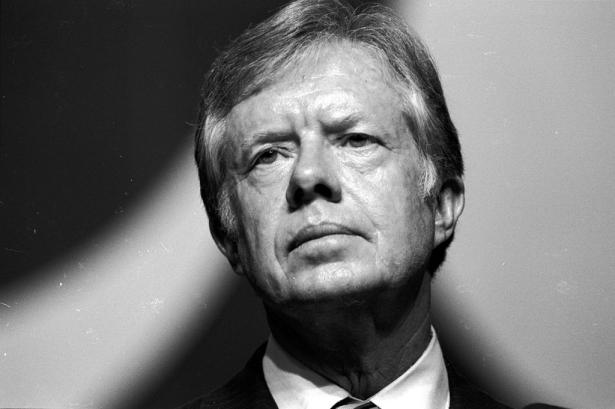I watched TV like everyone else on Inauguration Day, January 1977, when new president Jimmy Carter, his wife Rosalynn, and daughter Amy got out of their limo and walked the final stretch to the site of his speech.
I left high school, went to work, and joined my first union in the Carter years. But by 1980 — the first election where I was old enough to vote — I didn’t vote to reelect Jimmy Carter. Union friends and Democrats alike pleaded with me. “It’s the most important election of your life! You have to vote for Carter!” Not me. I was already aware by then of the impacts that failed politicians and their politics can have on your life. My one little vote didn’t matter anyway, since after almost four years of the Carter presidency just about everyone I knew — and worked with — was voting for Ronald Reagan, an even worse alternative, anyway. If they were voting at all.
My labor friends like to comment today that “it all started with Reagan.” As if a switch had been thrown and a cascade of awful things was suddenly unleashed on us. No so fast. For me, a young blue-collar worker, the hellish years of Reagan started when Carter was elected. No doubt Jimmy Carter inherited a titanic mess; the 1970s were years when the many sins of the past were catching up with the United States. But Carter raised hopes and expectations that the unemployment and inflation crises would be confronted and working people would not be the victims. Instead, we all found out that Carter was the original “New Democrat,” long before we knew what that meant. It meant a Southern, conservative Democrat not beholden to “big labor” and “liberals.”
Over the four years of his presidency, Jimmy Carter stumbled and ricocheted from one failure to the other. His pro-business bent led him to deregulate the trucking industry, the airlines, the railroads, and natural gas prices. This restored profit for corporations but led not to job growth but mass layoffs for the unionized workers in these industries. The consequences of this handiwork are still with us today. In order to curtail the raging price inflation of the times, Carter was eager to cap wages, only offering murky and unenforceable controls on prices. Corporations easily skirted the price controls. Working people and retirees saw the purchasing power of their paychecks and pensions evaporate week to week. Carter’s political fortunes evaporated likewise.
Unions that confronted inflation aggressively in their collective bargaining were coerced by the White House into standing down. Carter invoked the shameful Taft-Hartley Act against the United Mine Workers in their 1977–78 national coal strike. Most strikes in vital industries were pressured and threatened into settlements far short of what was needed for the membership. None received any White House support.
These collisions with labor led Carter to abandon any pretense of support for much-needed labor law reform as well as legislation protecting jobsite picketing by the building-trades unions. Both pro-union bills were fanatically opposed by big business, so Carter abandoned the pro-worker legislation. As his political fortunes plummeted, Carter began to oppose just about any beneficial legislation for working people, always claiming that the new law would be “inflationary.” His timid support for the heavily watered-down Humphrey-Hawkins Full Employment Act in 1977 was an early signal to labor that there was not going to be any significant legislative relief for working people under this president.
Carter’s foreign policy blunders and disgraces also helped torpedo his 1980 reelection. His support for the dictatorial regime of the Shah and his later handling of the Iranian embassy hostage crisis were twin debacles of historic proportions. His early support for the murderous Islamic fundamentalists in Afghanistan —justified as anti-Soviet maneuvers — reverberates in deadly form around the world even today. While foreign policy questions were remote to me as a young worker, Carter’s decision to enthusiastically revive the Selective Service military draft registration in 1979 was the last straw for me. Only six years after the unpopular draft had been cancelled, and with the entire Vietnam War’s mass killings repudiated by the bulk of the country, Carter yet again knuckled under to reactionary pressure in an absurd attempt to appease. (I never, ever registered, and had no problem slamming the door on the FBI agents who pestered me well into the 1980s.)
As Jimmy Carter aged gracefully and worked to redeem himself as a former president, I found myself once in a while thinking that Jimmy and Rosalynn would make nice next-door neighbors. But I cannot, I will not, forget his term in office and the effect it has had on me and tens of millions of other working people.
Share this article
Contributors
Chris Townsend was the United Electrical Workers (UE) Washington representative and the Amalgamated Transit Union (ATU) international union organizing director.
Our new issue, “Bye Bye Bidenism,” is out now. Subscribe to our print edition at a discounted rate today.


Spread the word